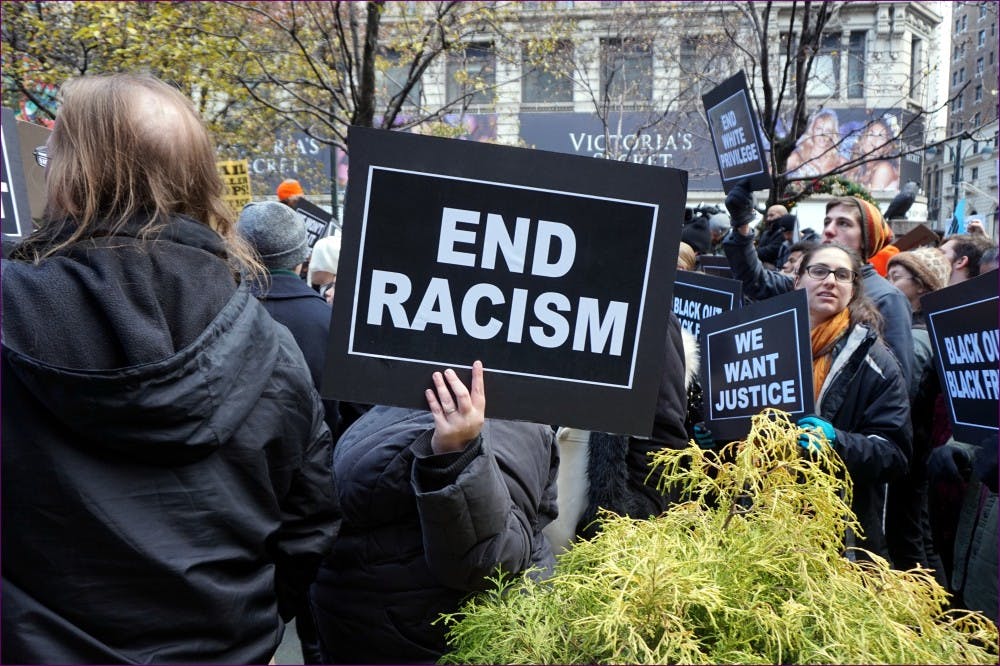Activist and co-founder of the Black Lives Matter movement, Alicia Garza, opened her talk Tuesday afternoon by recognizing the indigenous peoples’ lands that she stood upon and the indigenous communities that are on the front line fighting for the freedom and justice they deserve. It was a segue into a larger discussion about the liberation that the Black Lives Matter movement aims to bring to every community.
“It’s not a movement just for black people,” Garza said. “It’s a movement for us all to get right. White supremacy is a disease that’s killing every single one of us, just in different ways.”
Over 300 people gathered in Tyler Haynes Commons to hear Garza speak and over 50 more filled the overflow area in Gottwald Auditorium.
Garza pointed out that for some college students, their first interaction with black people was at University of Richmond. Thus, Garza ensured listeners that her talk would welcome and inform those who are actively engaged in human rights causes as well as those who are just hearing about the movement for the first time.
“It was a great opportunity for non-minorities to learn and ask questions about navigating the issues plaguing their roommates, classmates and friends of color on this campus,” Destiny LeVere, a senior, said.
Following the lecture, eight students had the opportunity to eat dinner with Garza and to discuss issues with her in a more intimate setting. Students who organized a campus racial justice demonstration last semester were asked to attend, Jennifer Erkulwater, political science professor, said. Erkulwater helped organize Garza's campus visit.
“Dinner was enlightening and relieving,” junior Cassandra Ceballos said. “It was comforting to connect with someone who works on the front line of these issues.”
Garza wasn’t always in the spotlight. Before Black Lives Matter took off, she worked on issues of police brutality, rights for domestic workers and violence against trans people of color in Oakland, California.
She said that Black Lives Matter “began as a love letter to black people in a moment that it was very visceral that black lives didn’t matter.”
She came together with Opal Tometi and Pattrisse Cullors after the acquittal of George Zimmerman, who shot Trayvon Martin in 2012, with a message for all those who felt wronged by the decision.
“We spoke from our hearts, our experience, our tiredness, our fatigue we have from black death,” Garza said. “We put this out there and had no idea it would become what it became.”
The movement has received various criticisms, including arguments that it resembles the Occupy Wall Street movement and that it is misguided. Garza took the opportunity to clarify what the Black Lives Matter movement aims toward at its core.
Enjoy what you're reading?
Signup for our newsletter
“Hashtags don’t start movements, people do," she said. "Technology plays a role, but it’s not central to movements in the making. It’s people.”
The hashtag #AllLivesMatter has been another way for politicians and protesters to criticize the movement’s focus on injustices specific to African Americans.
“Yes, all lives matter, in theory, they should," Garza said. "Every life should matter. But that’s not the world we live in.”
The Black Lives Matter movement implores people to take steps to ensure that black people are valued as much as white people.
“We depend on each other to survive," Garza said. "So no matter how much segregation there is, we need each other. We all have a responsibility and not everybody has to do the same thing. You don’t have to have a blow horn. But you have to do something. Do it for the people.”
Contact Jess Dankenbring at jess.dankenbring@richmond.edu
Support independent student media
You can make a tax-deductible donation by clicking the button below, which takes you to our secure PayPal account. The page is set up to receive contributions in whatever amount you designate. We look forward to using the money we raise to further our mission of providing honest and accurate information to students, faculty, staff, alumni and others in the general public.
Donate Now



